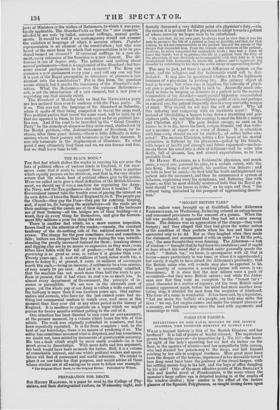PREPARATION FOR DEATH.
SIR HENRY MILFORD, in a paper he read to the College of Phy- sicians, and their distinguished visiters, on Wednesday night, inci- dentally discussed a very delichte point of a physician's duty,—viz. the course it is prudent for the physician to adopt towards a patient of whose recovery no hopes were to be entertained.
"He said that, for his own part, he always kept in view that it was his duty to preserve the life of a patient as long as possible; and that, for that reason, he did not communicate to the patient himself the extent of the danger that impended him. From the friends and relatives of the patient, however, he never concealed the melancholy truth ; they had a right to know the worst; but if to prolong the life of a patient were the duty of the physician, it was obviously as incompatible with that duty as it was inconsistent with humanity, to alarm the sufferer and to aggravate his disorder by exhibiting to his view the awful image of approaching death."
This may be just, yet there is great difference of opinion on the point, and the religious and the fashionable world will be divi- ded on it. It may also be questioned whether it be the legitimate business of a physician to prolong life. His primary object at least is to cure ; but when cure is hopeless, the relieving of physi- cal pain is perhaps all he ought to look to. Assuredly much mis- chief is done by keeping up delusion in a patient as to the assured termination of the disorder—much painful hypocrisy necessitated on the part of relatives—and, in a religious point of view, and perhaps in a moral one, the patient frequently dies in a very unworthy temper of mind. Why should we not face the evil at once ? Why all this faltering and tampering with an inevitable event ? Why, instead of blindfolding a human being down a stumbling and pre- cipitous path, why not teach the courage to meet the fate in a manly and Christian style ? The poor Indian savage, as soon as he knows he is to die, bows his head, resigns himself, and dies with- out a murmur of regret or a voice of dismay. It is education with him—why should we not be similarly, or rather better edu- cated? The modern Christian, within a few hours of his mortal extinction, is flattered by his physician—gulled by his friends, with hopes of health and strength and future enjoyment—medica- ments throw his mind into a state of delirium—and he sinks into death, full of dreams, lies, and absurd expectations, as he has probably lived. Sir HENRY HALFORD, as a fashionable physician, and much more, a royal one, pursued his plan, to a certain extent, with the late King. Being a state patient, his position was delicate ; and he tells us how he acted,—he first told the truth and frightened his patient into the sacrament, and then he commenced a system of delusion, explaining away his symptoms, and flattering him with hopes ; so that he most skilfully contrived both that his Royal pa- tient should" set his house in order," as he says, and then " die without being disturbed by the prospect of approaching dissolu- tion."


























 Previous page
Previous page